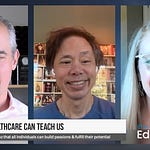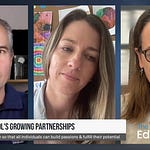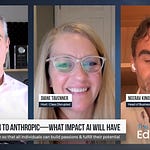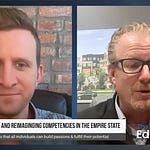Diane Tavenner and I talk through what we've learned from our recent miniseries on AI in education. We discuss how AI offers unprecedented access to expertise, but also highlight concerns about its effectiveness for young learners. Throughout the conversation, we grapple with skepticism, optimism, and the practical challenges of embedding AI in educational systems, all while looking ahead to what meaningful, student-centered innovation could look like.
Diane Tavenner
Hey, Michael.
Michael Horn
Hey, Diane. It's good to see you.
Diane Tavenner
It's good to see you, too. I'm excited to see you in person in the coming week. But, you know, and, and maybe we'll just jump right in because I think people know we've been doing this miniseries about AI And I'm going to jump in because I'm very excited for this conversation today. We have been talking to all these folks in this little mini series, and you've been doing a better job than I have of sort of just listening to them and letting them talk and not, you know, sort of interjecting your opinions and feelings. You know, that's a little bit hard for me. But today is our day where we get to do that. And so for our listeners, you know, sometimes you, you write to us or you tell us that you like kind of overhearing us talk to each other. And so this is that episode.
We have not talked to each other about all that we learned and discovered from these conversations. And so we're calling this kind of our out loud processing episode where we're going to go through and just process through. What do we hear? What do people say? What are, what were we thinking? What's our takeaways? And then we'll come back one more time and organize that and put that into kind of a final season episode and a final miniseries episode where we'll pull out the big headlines and the takeaways. But today it's going to be pretty raw conversation.
Michael Horn
Today is going to be raw, up close up, personal, all of the different demons in our heads. And if we miss something, send us a line, tell us what we missed. Because we have looked back on some of these conversations. Some of these conversations, I suspect, Diane, it's going to be more like, wow, I, this, this one thing has been really burning with me and I had to address that, but I sort of forgot some of the other points. So don't be shy about pointing that out to us. We, we really have enjoyed, I think it's fair to say, these conversations because it's really opened up to a lot of different perspectives. And I think there have been elements of truth or insight in every single conversation, totally. Even where we disagreed on certain elements or whatever else to me, it's just sort of like revealing the whole elephant, if you will.
Diane Tavenner
I couldn't agree more. That's probably a really important place to start, is with some gratitude. Thank you so much for the people who came to talk with us and share with us. It's been incredibly valuable for us. What we seem to be hearing is it's valuable for other folks. And so let's dive in. I'm, I'm going to take sort of that. I know for a fact that both of us, this has stuck with us.
It was from our first conversation with John Bailey and I think it was, for me, it was such an eye opening conversation. The idea that John is so clear that what AI provides is an expert on every subject in every person's pocket. And this idea that we now have this expertise just literally at our fingertips. And not only did he say that kind of at a high level, but I think what was amazing about what John did was he literally gave us these concrete examples of how he's using AI as an expert in his life. And they were like so many different examples. And then I of course went on to like to look at more of them and read more of them. And you know, he's probably the most creative person I've talked to about how he's really using AI as an expert. And so that one's just sitting with me.
I don't. And I've heard that from other people too. What, how did that one strike you, Michael?
Michael Horn
Yeah, I, I, so similar thing, Diane, which is, I think you take away, okay. Google gave us access to the world's knowledge. This gives us access to expertise. I think that's like a really interesting distinction. It lands for me. I think frankly, the thing I took away, or one of the things I took away from the episode we had with Sia from, from OpenAI was less the views on education and more how she actually uses the tool herself as this personal assistant to guide her learning agenda, to help her figure out what to learn and on and on. Made me feel somewhat inadequate as like a human in terms of all the things that I could be doing with this. I think I've forced myself to increase my usage in certain ways since then.
Right.
Diane Tavenner
Have you watched yourself changing at all because of these conversations?
Michael Horn
Yes, yes. So I will say and, and I, I'm curious if you've had the same thing, but number one, I search on Google a lot less than I used to.
Diane Tavenner
Almost never for me,
Michael Horn
So the only reason I don't is because I have access to the Gemini Advanced, I can't remember what they call it, but the advanced AI search feature, right. Which has a lot of the same qualities as chat, GPT or I guess a lot of folks use Perplexity for search because of the way it answers. Right. Your queries. But yeah, in general, I am not using semantic search really at all. I'm almost exclusively using AI to try to understand certain things. I will tell you, I was trying to get a much deeper understanding of the nursing and healthcare shortages across the country recently. I had Google Gemini and I'm blanking on the exact product, but it's their research product.
Create a, like a, it's like a five to seven page basically briefing for me on it. Super interesting how it did it and it, and it resolved one of the challenges I have, which is when you sort of just do a raw search, you get like, oh, by 2036, this is the projection. And I'm like, no, I want to know now. I want to know my specialty and where I like. Right. And you can get that now. And, and it's, it's really interesting Diane, what about you?
Diane Tavenner
So similarly, the only time I find myself going to a traditional search is out of habit. And then I get there and I'm like, wait, why are you doing this? You're going to get much better information. I'm using the paid version of chat right now.
Michael Horn
Yeah, that's what I largely use. I should.
Exploring Chat GPT Usage Trends
Diane Tavenner
Yeah. Well, it's interesting. One tip I've gotten from, you know, sort of insider is to, to actually cycle through them and use the different ones from time to time and see what you think. So I'm going to try to push myself to do that and not just fall into a single habit. Although we're not alone. You know, in the last couple of days the numbers have come out about the number of people across the planet using Chat GPT and it's extraordinary, like unprecedented. We might get to that in a little bit. But yeah, I find myself pushed by John in a lot of ways to just push my thinking on, wait, do you really need to be doing this? I keep asking myself that all day now, wait, do you really need to do that? Can, can an expert do that for you? Or, or in some cases things that I thought I couldn't know.
I'm now saying, wait, I think that might be possible. Like how could, how could we get to that? And so I, I feel like it really, these conversations have pushed my behavior and change and with positive results.
Listen to this episode with a 7-day free trial
Subscribe to The Future of Education to listen to this post and get 7 days of free access to the full post archives.












